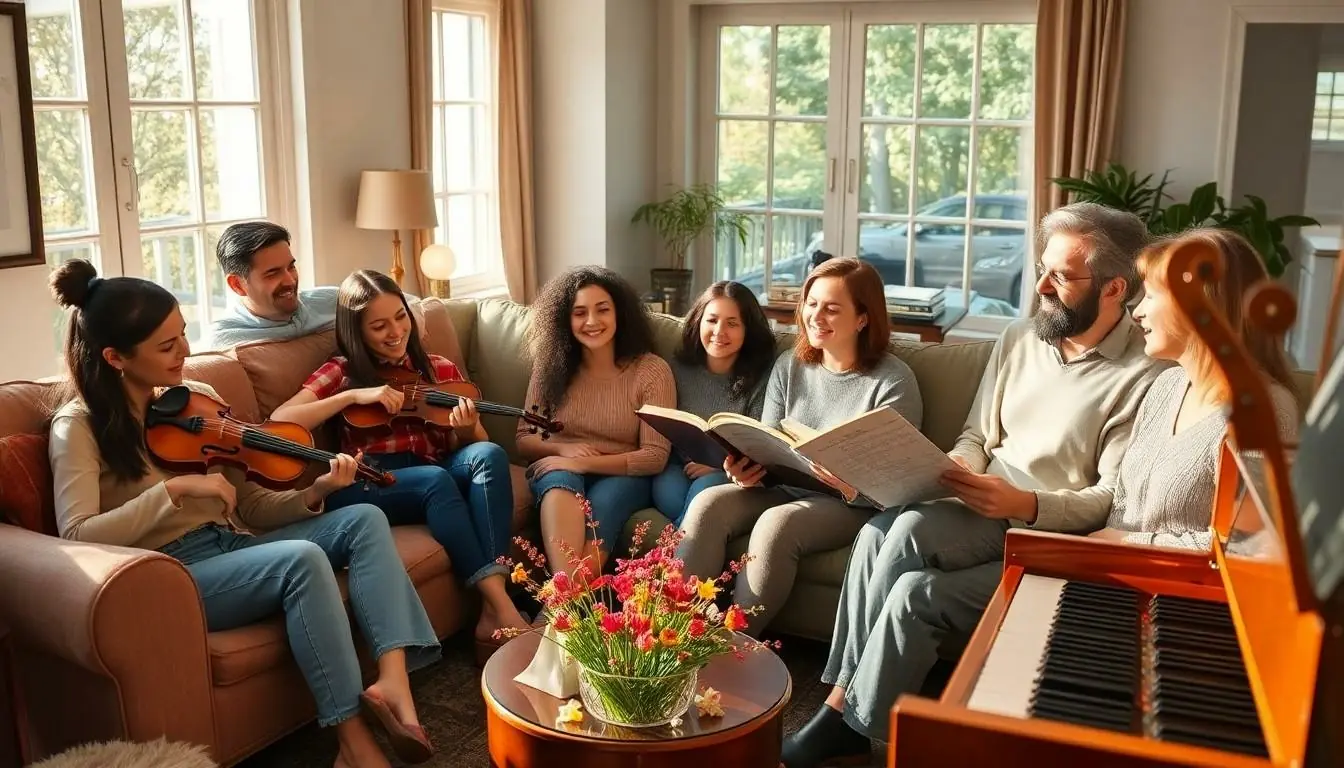Diving into classical music might feel like stepping into a fancy dinner party where everyone seems to know the secret handshake. But fear not! Classical music for beginners is more accessible than it seems. It’s not just for stuffy concert halls or snooty critics; it’s a vibrant world filled with emotion, drama, and yes, even a few surprises.
Table of Contents
ToggleUnderstanding Classical Music
Classical music, rich in history and emotional depth, offers a welcoming entry point for beginners. This genre spans centuries, inviting listeners to explore its unique elements.
Definition and Characteristics
Classical music refers to a broad tradition of music created from the 11th century onward. This genre showcases structured compositions, often for orchestras or chamber ensembles. Characteristics include harmony, melody, and contrast, leading to a range of expressions. Forms such as symphonies, concertos, and operas frequently feature intricate arrangements. Rhythmic diversity enriches the listening experience, allowing for varying tempo and dynamics throughout pieces. Attention to instrumentation expands sound opportunities, highlighting strings, woodwinds, brass, and percussion.
Key Composers and Their Works
Famous composers significantly shaped classical music. Johann Sebastian Bach created masterpieces like “Brandenburg Concertos” and “The Well-Tempered Clavier.” Ludwig van Beethoven contributed monumental works such as “Symphony No. 5” and “Moonlight Sonata.” Wolfgang Amadeus Mozart, renowned for his operas and symphonies, penned pieces like “The Magic Flute” and “Eine kleine Nachtmusik.” Pyotr Ilyich Tchaikovsky captured emotions in “Swan Lake” and “1812 Overture.” Claude Debussy introduced innovative approaches with works like “Clair de Lune.” Each composer’s contributions represent distinct styles and periods, enriching classical music’s vast tapestry.
Benefits of Listening to Classical Music

Listening to classical music offers numerous benefits that enhance both mental capabilities and emotional health. Engaging with this genre can enrich one’s life in various ways.
Cognitive Development
Cognitive development thrives through classical music. Research indicates that exposure to structured compositions improves memory and concentration. Students who listen to classical music often score higher on cognitive tests. New studies suggest that engaging with complex rhythms also enhances problem-solving skills. Playing instruments within a classical context further develops hand-eye coordination and fine motor skills. The variety of styles encourages adaptability in thinking, fostering creativity and innovation.
Emotional Well-being
Emotional well-being significantly improves with classical music. Listeners often experience reduced stress levels and increased relaxation. The soothing melodies and harmonies can trigger the release of endorphins, enhancing mood. Many find that specific pieces resonate with their feelings, providing comfort during difficult times. Exposure to classical music also nurtures emotional intelligence, allowing individuals to process their emotions more effectively. Participating in music appreciation activities promotes connections with others, further reinforcing emotional health.
Recommended Classical Music Pieces for Beginners
Exploring classical music introduces newcomers to a world of diverse sounds and emotions. Here are some recommended pieces that provide a solid foundation for beginners.
Easy Listening Selections
Mozart’s Eine kleine Nachtmusik offers a delightful blend of charm and elegance. This lively piece captivates audiences with its catchy melodies and cheerful rhythms. Debussy’s Clair de Lune creates a soothing atmosphere, inviting listeners into a serene musical landscape. Vivaldi’s Spring from The Four Seasons features bright melodies that evoke the joy of nature’s rebirth, making it instantly relatable.
Iconic Masterpieces
Bach’s Brandenburg Concerto No. 3 showcases intricate musical dialogues, highlighting the brilliance of Baroque composition. Beethoven’s Symphony No. 5 captivates with its powerful motifs representing victory over adversity. Tchaikovsky’s Swan Lake features lush orchestration, embodying emotion and storytelling through music. Lastly, the Adagio for Strings by Barber resonates deeply, touching on themes of loss and reflection, making it a poignant introduction to classical expression.
Tips for Exploring Classical Music
Exploring classical music opens new auditory experiences. Beginners can easily find personal preferences by listening to various styles and compositions.
Finding Your Preferred Style
Experimentation with different composers defines personal taste. Progressive exposure to Baroque, Romantic, and Impressionist periods reveals individual favorites. Listening to Bach’s structured compositions contrasts with the emotional expressiveness of Tchaikovsky. Each piece showcases unique elements that may resonate differently, from Mozart’s elegance to Debussy’s atmospheric tones. Ultimately, developing a playlist featuring a range of styles enhances enjoyment and understanding.
Resources for Learning More
Numerous resources enrich classical music knowledge. Online platforms like YouTube host performances, allowing for immersive experiences. Websites such as Spotify curate playlists tailored to specific moods or themes. Books on composers and their works provide historical context and deepen appreciation. Additionally, mobile applications offer guided listening experiences, helping beginners identify key features in compositions. Exploration through these resources ensures a structured and informative journey into classical music.
Diving into classical music opens up a world of emotion and creativity for beginners. This genre not only enriches the mind but also nurtures the spirit. By exploring various composers and styles, newcomers can find personal connections that enhance their listening experience.
With a wealth of resources available, including playlists and mobile apps, anyone can embark on this musical journey with confidence. As they discover the beauty and complexity of classical music, they’ll likely find it a rewarding and transformative part of their lives. Embracing classical music is an invitation to explore a timeless art form that resonates across generations.


